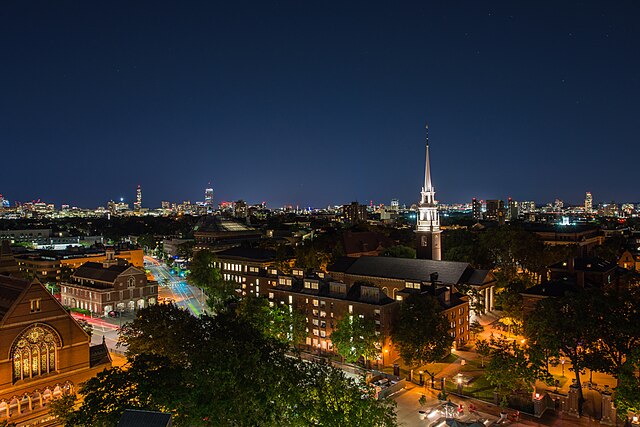History of Harvard University: Difference between revisions - Wikipedia
 Article Images
Article Images
Content deleted Content added
Line 16: By 1636, some 17,000 [[Puritans]] had migrated to [[New England]], and Harvard was founded in anticipation of the need for training clergy for the new commonwealth, a "church in the wilderness". Harvard was established that year by vote of the [[Massachusetts General Court|Great and General Court]], the governing legislative body of [[Colonial history of the United States|colonial]]-era [[Massachusetts Bay Colony]], one of the original [[Thirteen Colonies]]. [[Nathaniel Eaton]] oversaw the On March 13, 1639, the college was named [[Harvard College]] in honor of the [[Puritans|Puritan]] clergyman [[John Harvard (clergyman)|John Harvard]], a [[University of Cambridge]] alumnus who willed the new school [[Pound sign|£]]779 [[pounds sterling]] and his library of some 400 books.<ref>{{cite book |last1=Morison |first1=Samuel Eliot |title=The Founding of Harvard College |date=1995 |publisher=Harvard University Press |isbn=978-0-674-31451-1 |page=221 |url=https://books.google.com/books?id=PQMdzhnfaSwC&q=%22harvard+college%22+march+13&pg=PA221 |access-date=16 February 2020 |language=en |archive-date=January 29, 2022 |archive-url=https://web.archive.org/web/20220129215729/https://books.google.com/books?id=PQMdzhnfaSwC&q=%22harvard+college%22+march+13&pg=PA221 |url-status=live }}</ref><ref name="JH facts">{{cite web|title=John Harvard Facts, Information.|url=http://www.encyclopedia.com/topic/John_Harvard.aspx|publisher=The Columbia Encyclopedia, Sixth Edition. 2008|access-date=2009-07-17|quote=He bequeathed £780 (half his estate) and his library of 320 volumes to the new established college at Cambridge, Mass., which was named in his honor.|archive-date=July 15, 2009|archive-url=https://web.archive.org/web/20090715230532/http://www.encyclopedia.com/topic/John_Harvard.aspx|url-status=live}}</ref> Line 22: In the 1640s, Harvard College established the [[Harvard Indian College]], which educated Native American students. It was only attended by a handful of students, only one of whom graduated. The colony charter creating the [[Harvard Corporation]] was granted in 1650 at the beginning of the [[English Interregnum]]. When [[Henry Dunster]], the university's second [[President of Harvard University|president]] from 1640 to 1654, Dunster's conflict with the colony's magistrates began when he failed to have his infant son baptized, believing as an adherent of the [[Believers baptism]] of English Baptists and/or [[Anabaptists]] that only adults should be baptized. Efforts to restore Dunster to Puritan orthodoxy failed and his apostasy proved untenable to colony leaders who had entrusted him in his job as Harvard's president to uphold the colony's religious mission, thus he represented a threat to the stability of society. Dunster exiled himself in 1654 and moved to nearby [[Plymouth Colony]], where he died in 1658.<ref>Timothy L. Wood, "'I Spake the Truth in the Feare of God': the Puritan Management of Dissent During the Henry Dunster Controversy," ''Historical Journal of Massachusetts'' 2005 33(1): 1-19,</ref> Because it had been illegal for the colony to establish a college, [[Charles II of England|Charles II]] rescinded the Massachusetts Bay Colony charter in 1684 by writ of [[scire facias]].<ref>{{cite book | author=Baker, J. H. | author-link=John Baker (legal historian) | title=An Introduction to English Legal History | edition=4th | location=London | publisher=Butterworths | isbn=978-0-406-93053-8 | year=2002 | page=''p.''145 }}</ref> In 1692, the leading Puritan divine [[Increase Mather]] became Harvard's sixth president. The [[Dedham, Massachusetts|town of Dedham]] was founded in 1636, the same year as the college. The first minister of the [[First Church and Parish in Dedham]], [[John Allin (Puritan minister)|John Allin]], served as an overseer, and every minister through 1861 was connected to the university.{{sfn|Smith|1936|p=67}} Given its population and modest means, the support the community provided to the college was generous.{{sfn|Smith|1936|p=67}} Allen donated two cows, presumably to provide milk for the president and tutors.{{sfn|Smith|1936|p=67}} | |||